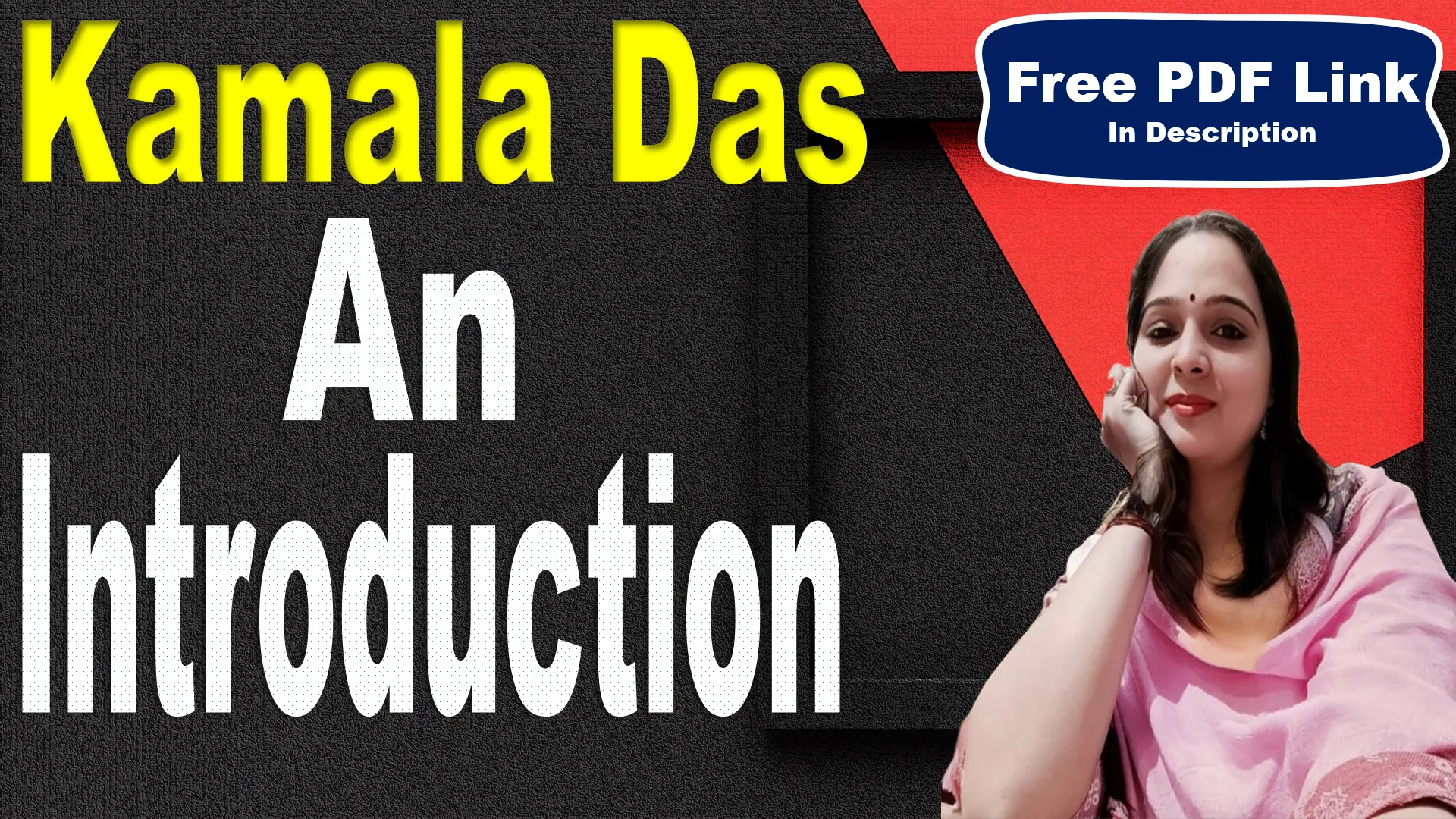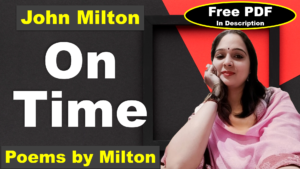An Introduction by Kamala Das Summary
Kamala Das wrote An Introduction as a part of her poetry collection Summer in Calcutta, which was published in 1965. This poem is one of her most famous works and is often regarded as a landmark in Indian feminist literature.
Kamala Das was known for her bold and confessional style of writing. She openly discussed themes like identity, gender roles, love, desire, and societal expectations, which were considered unconventional at the time. An Introduction is a deeply personal poem that reflects her struggles as a woman, an artist, and an individual in a conservative society.
Kamala Das’s poem An Introduction is about her personal experiences with identity, language, gender roles, and self-expression. She talks about how society tries to control her choices, but she refuses to be confined by rules.
At the beginning of the poem, she says she does not know much about politics but knows the names of political leaders, just like she remembers the days of the week or months of the year. She proudly says that she is an Indian, born in Malabar, and speaks multiple languages. However, people criticize her for writing in English, saying it is not her mother tongue. She responds by saying that any language she speaks becomes her own, no matter how different or imperfect it may be.
Next, she talks about her struggles as a woman. When she was young, she was told to behave in a certain way, dress like a girl, and fit into the role of a wife. Society expected her to cook, embroider, and argue with servants. But she did not want to be trapped in these roles. She cut her hair, wore her brother’s trousers, and rejected the idea that she must behave in a certain way just because she was a woman.
She also talks about love and relationships. She recalls being pushed into a marriage at a young age, where she felt crushed by expectations. Later, she falls in love, but she realizes that love and desire are complicated and often bring pain.
In the end, she says she is both a sinner and a saint, the betrayed and the beloved. Her emotions, struggles, and experiences are universal. She is not just one person—she represents every woman who seeks freedom and love.
Key Points
Author
Kamala Das (1934–2009) was an Indian poet, writer, and feminist.
Known for her confessional style, she wrote about love, desire, identity, and gender roles.
She wrote in both English and Malayalam, using the pen name Madhavikutty in Malayalam.
An Introduction is one of her most famous works, reflecting her personal experiences and societal struggles.
Form
The poem is written in free verse, meaning it has no fixed rhyme scheme or meter.
This lack of structure reflects her defiance against societal norms.
The poem flows in a stream-of-consciousness style, making it feel spontaneous and deeply personal.
Speaker
The speaker is Kamala Das herself, making the poem autobiographical.
She represents not just herself but all women who struggle with patriarchal oppression and identity crises.
The poem shifts from personal experiences to universal human emotions, making it relatable to all.
Setting
The poem does not have a fixed physical setting but moves through:
Her childhood and early experiences with marriage.
Her conflict with societal expectations.
Her realization of universal human struggles.
It reflects both personal and social settings, dealing with Indian cultural norms and women’s roles in a patriarchal society.
Theme
The poem explores several key themes:
Identity and Self-Expression
The poet refuses to be categorized or restricted by society.
She defends her right to write in English and express herself freely.
Gender Roles and Patriarchy
Women are expected to fit into traditional roles (wife, homemaker).
She rebels by cutting her hair, wearing trousers, and rejecting societal expectations.
Love, Desire, and Betrayal
She longs for love but experiences disillusionment in marriage.
She expresses women’s struggles with sexuality and emotional vulnerability.
Universality of Human Experience
She states that her joys and pains are shared by all.
The poem ends with her declaring herself as part of all humanity.
Plot
The poet begins by rejecting politics, stating she only remembers leaders’ names.
She asserts her Indian identity and defends her right to write in English.
She describes her forced entry into marriage and the burden of womanhood.
She rebels against traditional gender roles by dressing like a man and rejecting societal labels.
Society criticizes her choices, telling her to conform.
She expresses love, desire, loneliness, and shame.
She realizes that all humans share similar experiences—she is both sinner and saint, loved and betrayed.
She concludes by stating that she, like everyone else, calls herself “I”, showing her universal connection to humanity.
Tone
Defiant – The poet challenges social norms and patriarchal expectations.
Confessional – She openly shares her personal struggles.
Introspective – She reflects deeply on her identity and emotions.
Universal – The ending suggests that her experiences are shared by all humans.
Style
Free verse – No fixed rhyme scheme, making the poem feel natural and spontaneous.
Conversational tone – Feels like she is directly speaking to the reader.
Use of symbolism – Rivers (male desire), oceans (female patience), sword in sheath (repressed masculinity).
Repetition and anaphora – “I am… I am…” to emphasize her self-assertion.
Use of contrasts – “I am sinner, I am saint.” to show the complexity of human nature.
Message
Women should be free to express themselves without societal restrictions.
Identity is fluid and personal—one should not be forced into predefined roles.
Love and pain, sin and virtue, joy and suffering—are universal experiences.
Breaking societal norms is necessary for self-discovery and personal freedom.
Kamala Das: Short Biography
Word Meaning
| Tough Word | Meaning in English | Meaning in Hindi |
| Distortions | Changes that make something unclear or wrong | विकृतियाँ, गलत तरीके से बदलना |
| Queernesses | Unusual or strange qualities | अजीबियत, विचित्रता |
| Longings | Strong desires or wishes | चाहत, आकांक्षाएँ |
| Cawing | The loud sound made by crows | कौवे की आवाज़ |
| Crows | A type of bird that makes a cawing sound | कौवे |
| Roaring | A loud, deep sound like a lion’s growl | गर्जना, दहाड़ |
| Storm | A strong, violent weather with rain and wind | तूफ़ान |
| Incoherent | Something that is unclear or difficult to understand | अस्पष्ट, अव्यक्त |
| Mutterings | Quiet or low sounds, often not clear | बड़बड़ाहट, धीमे से कहना |
| Blazing | Burning brightly or very hot | प्रचंड, तेज़ आग |
| Funeral pyre | A pile of wood where a dead body is burned in a funeral | चिता |
| Sprouted | Began to grow, especially from seeds | अंकुरित होना |
| Shrank | Became smaller or reduced in size | सिकुड़ना, छोटा होना |
| Pitifully | In a way that makes people feel sorry | दुखद तरीके से |
| Embroiderer | Someone who decorates fabric with thread | कढ़ाई करनेवाला |
| Quarreller | Someone who fights or argues | झगड़नेवाला |
| Categorizers | People who sort or group things into categories | वर्गीकृत करनेवाले |
| Peep | To look secretly or quickly | झाँकना |
| Lace-draped | Covered with lace (a delicate fabric) | लेस से ढका हुआ |
| Amy | A name used for a westernized identity | एमी (पश्चिमी नाम) |
| Madhavikutty | The pen name Kamala Das used in Malayalam | माधविकुट्टी (नाम) |
| Pretending | Acting like something is true when it’s not | बहाना करना |
| Schizophrenia | A serious mental illness that affects thinking and emotions | मानसिक विकार, मस्तिष्क की बीमारी |
| Nympho | A slang term for a woman with excessive sexual desire | कामुक (महिला के लिए शब्द) |
| Embarrassingly | In a way that makes someone feel ashamed | शर्म से |
| Jilted | Rejected or left, especially in a romantic relationship | ठुकराया हुआ, छोड़ दिया गया |
| Haste of rivers | The quick, rushing flow of rivers, representing men’s desire | नदियों की तेज़ गति, पुरुषों की इच्छा |
| Tireless | Without getting tired, always going on | बिना थके हुए |
| Sword | A sharp weapon used for fighting | तलवार |
| Sheath | A cover or case for a sword | म्यान |
| Rattle | A sharp, quick noise, often indicating alarm or worry | शोर, झंकार |
| Throat | The part of the body used for breathing and talking | गला |
| Sinner | A person who does something wrong or immoral | पापी |
| Betrayed | Tricked or hurt by someone who you trust | धोखा दिया गया |
| Aches | Pain or discomfort in the body | दर्द, पीड़ा |










